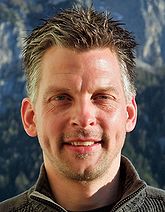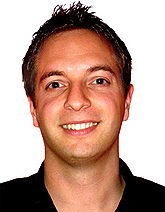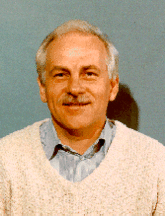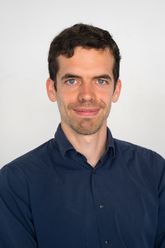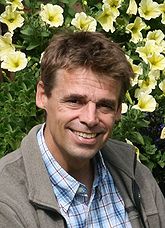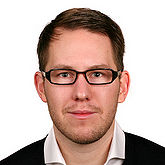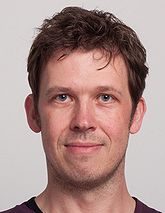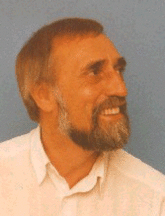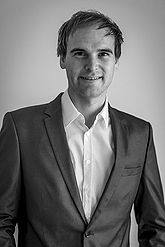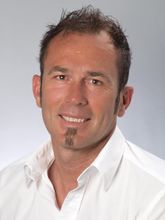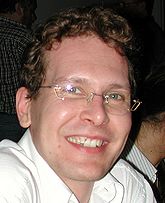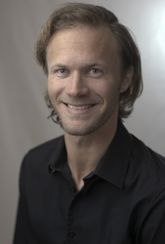Difference between revisions of "Biographies and Bibliographies/LNTwww members from LNT"
| Line 91: | Line 91: | ||
| − | + | A great hobby of Thomas Hindelang is endurance sports. As successes are placements in the top 10% at several marathons in Munich and Berlin, the placement in the top third at the mountain runs Jungfrau Marathon (42 km, 1800 vertical meters) and "Swiss Alpine" (78 km, 2300 vertical meters) and the time of 10:35 h at the Ironman in Regensburg 2011. | |
{{BlaueBox|TEXT= | {{BlaueBox|TEXT= | ||
| − | ''' | + | '''His contributions to the LNTww project''': |
| − | * | + | *From 2007 - 2012, Dr. Hindelang held the lecture "Mobilfunk" at the Institute of Communications Engineering as a lecturer. |
| − | * | + | *His contributions to LNTwww, in particular to the books "Mobile Communications" and "Examples of Communication Systems", also date from this time.}} |
| Line 103: | Line 103: | ||
[[File:Lutz.jpg|165px|right|Tobias Lutz]] | [[File:Lutz.jpg|165px|right|Tobias Lutz]] | ||
| − | Tobias Lutz, 1980 in Krumbach | + | Tobias Lutz, born in 1980 in Krumbach, studied electrical engineering and information technology at the Technical University of Munich from 2002 to 2008. After completing his undergraduate studies, he moved to the "Rensselaer Polytechnic Institute" (RPI) in Troy, New York, for a one-year guest study in 2005/06. From 2008 to 2014, Tobias Lutz was a research assistant to [[Biographies_and_Bibliographies/Chair_holders_of_the_LNT_since_1962#Prof._Dr._Ralf_K.C3.B6tter_.282007-2009.29|Prof. Ralf Kötter]] and [[Biographies_and_Bibliographies/Chair_holders_of_the_LNT_since_1962#Prof._Dr._sc._techn._Gerhard_Kramer_.28seit_2010.29|Prof. Gerhard Kramer]] at the Institute of Communications Technology (LNT) at the Technical University of Munich. During this time, he also completed a degree in business mathematics at LMU Munich. |
| − | + | During the first three years of his assistantship, Tobias Lutz worked for the European research project "N-Crave", where he dealt with theoretical aspects of network coding as well as the implementation of network protocols. | |
| − | + | From August 2012 to April 2013, he spent an eight-month research stay at "Stanford University". During this time, he attended various courses from the field of mathematics and computer science and engaged in research on memory-based channels. Regarding teaching, Tobias Lutz organized the basic practical course in communications engineering for four years. Furthermore, he supervised student work within the framework of various. In the last third of his assistantship Tobias Lutz was twice supervisor of the lecture "Advanced Topics in Communications Engineering" as well as of the lecture "Information Theory". In 2012, he received a "Qualcomm Innovation Fellowship" in the amount of 10.000 €. | |
| − | |||
| − | + | His scientific interest during his LNT time was "Multi-user Information Theory". Specifically, he worked on the "design of timing codes for half-duplex constrained networks" and their information theoretic analysis. This was also the topic of his PhD thesis (2014) with Prof. Gerhard Kramer. | |
{{BlaueBox|TEXT= | {{BlaueBox|TEXT= | ||
| − | ''' | + | '''His contributions to the LNTwww project''': |
| − | * | + | * He has been very supportive in the preparation of the book [[Information theory]], |
| − | * | + | *especially in the understandable formulation of not quite simple mathematical relations.}} |
| Line 123: | Line 122: | ||
[[File:Mecking.jpg|165px|right|]] | [[File:Mecking.jpg|165px|right|]] | ||
| − | Michael Mecking, | + | Michael Mecking, born on 23.2.1972 in Karlsruhe, was a scientific assistant at the LNT from 1997 to 2003. During this time, he worked on the projects "Receiver techniques for UMTS" and "Access strategies for the uplink of CDMA systems with channel-controlled scheduling" with Siemens. In 2001 he spent five months at the EPFL in Lausanne with Prof. Bixio Rimoldi. |
| − | + | The focus of his research was multi-user information theory for mobile radio channels. He completed his PhD thesis on "Fading Multiple-Access with Channel State Information" in November 2003. His thesis advisor was Prof. [[Biographies_and_Bibliographies/Chair_holders_of_the_LNT_since_1962#Prof._Dr.-Ing._Dr.-Ing._E.h._Joachim_Hagenauer_.281993-2006.29|Joachim Hagenauer]]. The dissertation was awarded the Rohde & Schwarz Prize of the Faculty of Electrical Engineering and Information Technology in 2004. | |
| − | + | Since September 2003, Dr. Mecking has been working at BMW AG in various areas of electrics and electronics, first for human-machine interface design and later in electrics/electronics integration. From 2015 to 2017, he was responsible for change control in the area of electrics/electronics, vehicle dynamics and powertrain at BMW Manufacturing Co in South Carolina, USA. Since his return to Germany in the summer of 2017, Dr. Mecking has led the department for integration and validation of the electrical/electronic vehicle dynamics and powertrain scopes at BMW's Regensburg and Oxford sites. | |
{{BlaueBox|TEXT= | {{BlaueBox|TEXT= | ||
| − | ''' | + | '''His contributions to the LNTww project''': |
| − | * | + | *From 2004 to 2012, Dr. Mecking taught the lecture "Information Theory and Source Coding" as a lecturer, for which he was already independently responsible in 1998-2002. |
| − | * | + | *His script at that time was a great help for us in writing the book "Information Theory". We were able to adopt much of it with his approval.}} |
| Line 160: | Line 159: | ||
[[File:Stinner1.jpg|165px|right|Markus Stinner]] | [[File:Stinner1.jpg|165px|right|Markus Stinner]] | ||
| − | Markus Stinner | + | Markus Stinner was born in Ulm in 1986. He studied electrical engineering at the University of Ulm from 2006 to 2011. His studies included a semester abroad at the University of Adelaide, Australia in 2008. |
| − | + | After finishing his diploma thesis at the Institute of Telecommunications and Applied Information Technology, which dealt with "Partial Unit Memory Codes" based on Gabidulin codes, he was a research assistant to [[Biographies_and_Bibliographies/Chair_holders_of_the_LNT_since_1962#Prof._Dr._sc._techn._Gerhard_Kramer_.28seit_2010.29|Prof. Kramer]] at LNT from 2011. His focus was on the analysis of "Spatially Coupled Low-Density Parity-Check Codes" for finite lengths. He was at ENSEA in Cergy-Pontoise for a research visit in June 2012, at Lund University in Sweden in November 2015, and at EPFL in Lausanne in April 2016. The topic of his PhD in September 2016 was "Analysis of Spatially Coupled LDPC Codes on the Binary Erasure Channel". | |
| − | In | + | In teaching, Markus Stinner supervised the "Basic Laboratory Course on Telecommunications" for many years and since 2014 the exercises for the lecture "Channel Codes for Iterative Decoding". In addition, he was responsible for the lecture "Communications Technology 1" at TUM¬Asia in Singapore in 2015. In 2011/2012, his other tasks at LNT included working on the project "CONE - Coding for Networks" in collaboration with Alcatel Lucent Bell Labs, in which efficient channel codes and modulations for wireless links such as backhaul and 5G systems were developed and compared. |
| − | + | More information on Dr. Stinner's career can be found [https://www.linkedin.com/in/markusstinner '''here''']. | |
{{BlaueBox|TEXT= | {{BlaueBox|TEXT= | ||
| − | ''' | + | '''His contributions to the LNTww project''': |
| − | * | + | *He was at LNT for several years as a system administrator jointly responsible for design/maintenance of the computer network and all IT systems. |
| − | *2016 | + | *In 2016, Markus led the porting of the "old LNTwww" (version 2) to the present wiki form (version 3) with a team of students. |
| − | * | + | *At the end of 2016, Markus left the LNT. Building on his work, we have been able to release the "new LNTwww" two years after his departure. |
| − | * | + | *Many thanks for your excellent and forward-looking work. Without your almost penetrating persistence, this improved version would not have existed.}} |
| Line 180: | Line 179: | ||
[[File:Stocki.jpg|165px|right|Markus Stinner]] | [[File:Stocki.jpg|165px|right|Markus Stinner]] | ||
| − | Thomas Stockhammer, | + | Thomas Stockhammer, born in Traunstein, Germany, in 1971, studied and earned his doctorate at the Institute of Communications Engineering at the Technical University of Munich (TUM). During this time he visited the Rensselear Politechnical Institute (RPI), Troy, NY, USA and the University of California San Diego (UCSD), San Diego, CA, USA as a visiting researcher. |
| − | + | After 10 years as founder and executive director for "Novel Mobile Radio" (NoMoR) research, he finally started at "Qualcomm" in 2014 as Director Technical Standards. As part of the various roles, he has published more than 200 research publications and more than 150 patents. | |
| − | In | + | In his daily work, he has leadership and editing positions in various standardization bodies and industry forums such as 3GPP, DVB, MPEG, IETF, ATSC, CTA, VR Industry Forum and the DASH-Industry Forum in the area of multimedia communications, TeleVision transmission and distribution, Internet protocols, virtual reality and adaptive streaming. Thomas was awarded the "INCITS Technical Excellence Award" (2013) for his "MPEG DASH" contributions and the "3GPP Excellence Ward" (2017) for his contributions on "Enhanced TV". |
{{BlaueBox|TEXT= | {{BlaueBox|TEXT= | ||
| − | ''' | + | '''His contributions to the LNTww project''': |
| − | * | + | *Competent advisor and expert for the book "Theory of Stochastic Signals".}} |
| Line 197: | Line 196: | ||
[[File:Zangl_2.jpg|165px|right|Johannes Zangl]] | [[File:Zangl_2.jpg|165px|right|Johannes Zangl]] | ||
| − | Johannes Zangl, | + | Johannes Zangl, born in Augsburg in 1974, studied electrical engineering and information technology at the TUM and was a research associate at the LNT from 2000. During this time, he worked on a multi-year DFG project in the priority program "Adaptivity in heterogeneous communication networks with wireless access (AKOM)", among others. He received his PhD in 2005 on the topic of "Multi-hop networks with channel coding and medium access control (MAC)" under Prof. [[Biographies_and_Bibliographies/Chair_holders_of_the_LNT_since_1962#Prof._Dr.-Ing._Dr.-Ing._E.h._Joachim_Hagenauer_.281993-2006.29|Joachim Hagenauer]]. |
| − | |||
| − | + | In the area of teaching, Johannes Zangl supervised the lectures "Fundamentals of Information Technology" and the "Mobile Communications Lab" for many years, as well as "Channel Coding" in the summer semester 2005. In addition, he was responsible for the support of the LNT computer network and the mobile communications lab as a system administrator. | |
| − | + | From 2006 Dr. Zangl was an employee at Infineon Technologies in Munich and worked as a development engineer in the verification of VDSL2. In 2008, he moved to Rohde & Schwarz in Munich to the Center of Competence for Digital Signal Processing, where his tasks included the development of FPGA components for radar signal analysis systems, among others. In June 2014, Dr. Zangl moved in-house to device development for network and spectrum analyzers. | |
{{BlaueBox|TEXT= | {{BlaueBox|TEXT= | ||
| − | ''' | + | '''His contributions to the LNTww project''': |
| − | * | + | *To his great credit, he scanned our crashed hard drive bit by bit for LNTwww parts in 2005, largely salvaging four years of work. |
| − | * | + | *Since then we know that it is not enough to make a backup, but that it must also be configured correctly. |
| − | * | + | *He was also a competent contact person and proofreader for the book "Theory of Stochastic Signals".}} |
==Dr.-Ing. Georg Zeitler (at LNT from 2007-2012)== | ==Dr.-Ing. Georg Zeitler (at LNT from 2007-2012)== | ||
| Line 214: | Line 212: | ||
[[File:Zeitler.jpg|165px|right|Johannes Zangl]] | [[File:Zeitler.jpg|165px|right|Johannes Zangl]] | ||
| − | Georg Zeitler, 1982 | + | Georg Zeitler, born in Munich in 1982, studied electrical engineering and information technology at the Technical University of Munich from 2002. After completing his bachelor's thesis, he transferred to the University of Illinois at Urbana-Champaign in 2005 for a two-year master's degree, where he specialized in signal processing and information engineering. After completing his master's thesis at UIUC on universal prediction of individual sequences, G. Zeitler was a research assistant to Prof. Kötter and Prof. Kramer from 2007 to 2012. His scientific interests were information-theoretic aspects and the optimization of low-resolution quantizers for intelligence systems. In spring 2010, he spent a three-month research stay at UIUC. |
| − | In | + | In teaching, Georg designed and supervised the central exercises and partly the lecture for the course "Communications Engineering 2". In addition, he supervised student work in the two seminars offered by the LNT and he acted as the students' contact person for industrial contacts (engineering practice in the bachelor's program EI). |
| − | + | From 2007 to 2010, his other tasks at the LNT included working on the research project "Network Coding for Multihop Relaying", n which quantize-and-forward strategies for relay networks were developed in collaboration with DOCOMO Euro-Labs GmbH. | |
| − | + | Since June 2012, Dr. Zeitler has been working at BMW AG in Munich. | |
{{BlaueBox|TEXT= | {{BlaueBox|TEXT= | ||
| − | ''' | + | '''His contributions to the LNTww project''': |
| − | * | + | *The main chapter 4 of the LNTwww book [[Digital Signal Transmission]] is largely based on manuscripts by him and Prof. [[Biographies_and_Bibliographies/Chair_holders_of_the_LNT_since_1962#Prof._Dr._Ralf_K.C3.B6tter_.282007-2009.29|Ralf Kötter]]. }} |
{{Display}} | {{Display}} | ||
Latest revision as of 12:43, 13 January 2022
During the creation of "LNTwww" many colleagues at the LNT gave us great support. In this context, we understand "LNT" to mean the "Lehrstuhl für Nachrichtentechnik" ⇒ "Chair of Communications Engineering".
In particular, we would like to thank the following (former) colleagues:
- $\text{Doris Dorn}$, who has made an almost uncountable amount of database entries since 2004, meticulously and almost error-free.
- $\text{Manfred Jürgens}$, $\text{Martin Kontny}$, $\text{Winfried Kretzinger}$ and $\text{Robert Schetterer}$ have been very supportive in audio, photo and video processing and system administration, respectively.
From the scientific staff we would like to especially thank the following (former) colleagues:
Contents
- 1 Dr.-Ing. Ronald Böhnke (at LNT from 2012-2014)
- 2 Dr.-Ing. Joschi Brauchle (at LNT from 2007-2015)
- 3 Dr.-Ing. Klaus Eichin (at LNT from 1972-2011)
- 4 Dr.-Ing. Francisco Javier García Gómez (at LNT from 2016-2021)
- 5 Dr.-Ing. Thomas Hindelang (at LNT from 1994-2000 und 2007-2012)
- 6 Dr.-Ing. Tobias Lutz (at LNT from 2008-2014)
- 7 Dr.-Ing. Michael Mecking (at LNT from 1997-2012)
- 8 Prof. Dr.-Ing. habil. Günter Söder (at LNT since 1974)
- 9 Dr.-Ing. Markus Stinner (at LNT from 2011-2016)
- 10 Dr.-Ing. Thomas Stockhammer (at LNT from 1995-2004)
- 11 Dr.-Ing. Johannes Zangl (at LNT from 2000-2006)
- 12 Dr.-Ing. Georg Zeitler (at LNT from 2007-2012)
Dr.-Ing. Ronald Böhnke (at LNT from 2012-2014)
Ronald Böhnke, born in Bremen in 1976, studied Electrical Engineering and Information Technology at the University of Bremen and worked there as a research assistant from September 2002 in the field of Communications Engineering, where he obtained his doctorate on "Efficient Detection and Adaptive Transmission for MIMO-OFDM Systems". During his studies, he completed a three-month internship at Intel Corporation's research center in Santa Clara, California. In addition, he was a visiting scientist at the Fraunhofer Institute for Telecommunications at the Heinrich Hertz Institute in Berlin for two months in 2002.
In September 2010, Ronald Böhnke became a research associate at the Chair of Communications and Navigation (NAV) at the Technical University of Munich and contributed to the design of a geostationary relay satellite system. After completing the project, he moved to the LNT in February 2012. Since June 2014, he has been working in the field of mobile communications at the "European Research Center" of Huawei Technologies Düsseldorf GmbH in Munich.
Ronald Böhnke was a member of the German National Academic Foundation and received the Karl Nix Award for the Baccalaureater, the VDE Award for the Diploma and a "Best Paper Award" at the "IEEE International Workshop on Cross-Layer Design 2007".
His contributions to the LNTwww project:
- Competent consultant and expert for the books "Information Theory" and "Channel Coding".
- Often he also had to take corrective actions.
Dr.-Ing. Joschi Brauchle (at LNT from 2007-2015)
Joschi Brauchle, born 1982 in Bad Reichenhall, studied electrical engineering and information technology at the Technical University of Munich from 2002 to 2007. After completing his intermediate diploma, he completed a one-year master's degree at the Georgia Institute of Technology in Atlanta, Georgia, USA in 2005/2006. In his diploma thesis at LNT he worked on "Soft-input decoding of Reed-Solomon codes in concatenated systems" and on "Soft-output list decoding of inner convolutional codes".
After finishing his diploma thesis, Joschi Brauchle was a research assistant of Prof. Kötter and Prof. Kramer. His research was mainly concerned with algebraic coding theory, and in particular with the properties of bivariate interpolation-based decoding schemes for Reed-Solomon codes, as well as with the error correction performance of multidimensional schemes on related code constructions. In winter 2013, he spent a three-month research stay at the University of Toronto, Canada. In December 2015, he received his PhD on the topic "Algebraic Decoding of Reed-Solomon and Related Codes".
In teaching, Joschi Brauchle designed and supervised the exercise for the lecture "Channel Coding" in the master's program from 2008 to 2013, for which he was awarded the lecturer prize of the student council for electrical engineering and information technology in 2013. He supervised various student papers in seminars as well as quite a few bachelor's and master's theses throughout his assistantship. In 2015 he organized the main seminar.
In addition, Joschi Brauchle was jointly responsible for the conception and maintenance of the computer network and all IT systems at the LNT as a system administrator from 2009 to 2015.
His contributions to the LNTwww project:
- In his capacity as system administrator, Joschi realized earlier than those responsible for LNTwww that our "old LNTwww" was indeed somewhat outdated.
- He put some basic and good thought into porting it to its present wiki form, for which we are all very grateful to him today.
Dr.-Ing. Klaus Eichin (at LNT from 1972-2011)
Klaus Eichin was born in Wolfach in 1946. He studied electrical engineering at the Technical University of Munich from 1965 onwards and obtained the title of Dipl.-Ing. in 1972. He was awarded a doctorate in engineering in 1984.
- Already during his diploma thesis he was together with his later doctoral supervisor Prof. Karlheinz Tröndle intensively engaged in the topic "Use of the computer in teaching".
- Afterwards, he worked at the Chair of Communications Engineering at the Technical University of Munich until his retirement in September 2011. In the last years, he focused on the research area of digital mobile radio.
- Furthermore, Dr. Eichin held events for students of the teaching profession at vocational schools (LB) as Academic Director.
His contributions to the LNTwww project:
- In 2001 Klaus Eichin was together with his colleague Günter Söder the initiator of this e-learning project and worked intensively on it until 2011.
- Among other things, Klaus was co-author on six of the total nine LNTwww books.
Dr.-Ing. Francisco Javier García Gómez (at LNT from 2016-2021)
Francisco Javier García Gómez received the B.Eng. degree in Telecommunication Technologies and Services in 2014 from the Technical University of Madrid, (Spain), and the M.Sc. degree in Communications Engineering in 2016 from the Technical University of Munich (TUM), Germany. The topic of his Master’s Thesis was “Linear and Non-linear Estimation Methods for Single Carrier and Multicarrier Coarsely Quantized MIMO Systems”.
From 2016 to 2021, he was a doctoral researcher under the supervision of Prof. Gerhard Kramer at TUM’s Institute for Communications Engineering (LNT). His research work was about the information theoretical analysis of the nonlinear optical fiber channel, with the goal of finding bounds on its capacity.
He taught the tutorial of the Bachelor lecture “Mobile Communications” and the tutorial of the Master lecture “Advanced Topics in Communications Engineering”. He was also responsible for the organization of Bachelor/Master Thesis Seminars.
His contributions to the LNTwww project:
- He has done essential preliminary work to be able to generate the English "$\rm en.LNTwww.de$" from "$\rm www.LNTwww.de$" with reasonable effort.
- 2020/2021, Javier led the student translation team as one of the project managers for the English version. During this time, four books were completed.
Dr.-Ing. Thomas Hindelang (at LNT from 1994-2000 und 2007-2012)
Thomas Hindelang received the Dipl.-Ing. and the PhD degree in electrical engineering from Technische Universität München (TUM), Germany, in 1994 and 2001, respectively. He worked as a Research Assistant at the Institute of Communications Engineering from 1994 to 2000, focusing primarily on the field of combined source and channel coding for mobile communications. While on leave from TUM, he served as a consultant at the Communications Research Department of AT&T Labs, Florham Park, NJ, from March to August 1999. From 2000 to 2008 he has been with Siemens AG and Nokia Siemens Networks GmbH & Co. KG, first in the area of Mobile Devices and later in the area of Mobile Networks. From 2002 to 2006 he actively participated and contributed to the 3GPP standardization body on physical layer issues for the Multimedia Broadcast and Multicast Service (MBMS) and 3G Long Term Evolution (LTE) standards. From 2006 till 2008 he led the group "Baseband Algorithms and Simulations", where he was responsible for the physical layer algorithms and simulations for GSM, UMTS, LTE, and WiMAX hardware development. Since October 2007 he is senior lecturer at TUM, and since November 2008 he works as an examiner in the area "Audio Video Media" at the European Patent Office. Dr. Hindelang holds approximately 40 patents and is the author of more than 30 published conference and journal papers. He contributed to the book "Advances in Digital Speech Transmission", edited by R. Martin, U. Heute, and C. Antweiler. His research interest includes the entire physical layer from the source until the channel, i.e., speech and video coding, error correction coding, equalization, and channel estimation techniques.
A great hobby of Thomas Hindelang is endurance sports. As successes are placements in the top 10% at several marathons in Munich and Berlin, the placement in the top third at the mountain runs Jungfrau Marathon (42 km, 1800 vertical meters) and "Swiss Alpine" (78 km, 2300 vertical meters) and the time of 10:35 h at the Ironman in Regensburg 2011.
His contributions to the LNTww project:
- From 2007 - 2012, Dr. Hindelang held the lecture "Mobilfunk" at the Institute of Communications Engineering as a lecturer.
- His contributions to LNTwww, in particular to the books "Mobile Communications" and "Examples of Communication Systems", also date from this time.
Dr.-Ing. Tobias Lutz (at LNT from 2008-2014)
Tobias Lutz, born in 1980 in Krumbach, studied electrical engineering and information technology at the Technical University of Munich from 2002 to 2008. After completing his undergraduate studies, he moved to the "Rensselaer Polytechnic Institute" (RPI) in Troy, New York, for a one-year guest study in 2005/06. From 2008 to 2014, Tobias Lutz was a research assistant to Prof. Ralf Kötter and Prof. Gerhard Kramer at the Institute of Communications Technology (LNT) at the Technical University of Munich. During this time, he also completed a degree in business mathematics at LMU Munich.
During the first three years of his assistantship, Tobias Lutz worked for the European research project "N-Crave", where he dealt with theoretical aspects of network coding as well as the implementation of network protocols.
From August 2012 to April 2013, he spent an eight-month research stay at "Stanford University". During this time, he attended various courses from the field of mathematics and computer science and engaged in research on memory-based channels. Regarding teaching, Tobias Lutz organized the basic practical course in communications engineering for four years. Furthermore, he supervised student work within the framework of various. In the last third of his assistantship Tobias Lutz was twice supervisor of the lecture "Advanced Topics in Communications Engineering" as well as of the lecture "Information Theory". In 2012, he received a "Qualcomm Innovation Fellowship" in the amount of 10.000 €.
His scientific interest during his LNT time was "Multi-user Information Theory". Specifically, he worked on the "design of timing codes for half-duplex constrained networks" and their information theoretic analysis. This was also the topic of his PhD thesis (2014) with Prof. Gerhard Kramer.
His contributions to the LNTwww project:
- He has been very supportive in the preparation of the book Information theory,
- especially in the understandable formulation of not quite simple mathematical relations.
Dr.-Ing. Michael Mecking (at LNT from 1997-2012)
Michael Mecking, born on 23.2.1972 in Karlsruhe, was a scientific assistant at the LNT from 1997 to 2003. During this time, he worked on the projects "Receiver techniques for UMTS" and "Access strategies for the uplink of CDMA systems with channel-controlled scheduling" with Siemens. In 2001 he spent five months at the EPFL in Lausanne with Prof. Bixio Rimoldi.
The focus of his research was multi-user information theory for mobile radio channels. He completed his PhD thesis on "Fading Multiple-Access with Channel State Information" in November 2003. His thesis advisor was Prof. Joachim Hagenauer. The dissertation was awarded the Rohde & Schwarz Prize of the Faculty of Electrical Engineering and Information Technology in 2004.
Since September 2003, Dr. Mecking has been working at BMW AG in various areas of electrics and electronics, first for human-machine interface design and later in electrics/electronics integration. From 2015 to 2017, he was responsible for change control in the area of electrics/electronics, vehicle dynamics and powertrain at BMW Manufacturing Co in South Carolina, USA. Since his return to Germany in the summer of 2017, Dr. Mecking has led the department for integration and validation of the electrical/electronic vehicle dynamics and powertrain scopes at BMW's Regensburg and Oxford sites.
His contributions to the LNTww project:
- From 2004 to 2012, Dr. Mecking taught the lecture "Information Theory and Source Coding" as a lecturer, for which he was already independently responsible in 1998-2002.
- His script at that time was a great help for us in writing the book "Information Theory". We were able to adopt much of it with his approval.
Prof. Dr.-Ing. habil. Günter Söder (at LNT since 1974)
Günter Söder was born in Nürnberg on March 21, 1946. He studied Electrical Engineering and Information Technology from 1964 at the "Ohm–Polytechnikum Nürnberg" (today: Technical University Nuremberg Georg Simon Ohm) and at the "Technischen Hochschule München" (today: Technical University Munich). He received the academic titles Ing.-grad. (1967), Dipl.-Ing. (1974), Dr.-Ing. (1981) and Dr.-Ing. habil. (1993).
- Günter Söder worked at the Department of Communications Engineering of the Technical University of Munich from 1974 until his retirement in 2011, mainly in the fields "Digital Transmission Systems" and "Stochastic Signal Theory&". He held various lectures and practical courses on these topics as Academic Director and Associate Professor (since 2004).
- He published the textbooks "Digitale Übertragungssysteme – Theorie, Optimierung und Dimensionierung der Basisbandsysteme" (1985 by Springer-Verlag Berlin) and the English version "Optimization of Digital Transmission Systems" (1987 by Artech House Inc., Boston), in each case jointly with his doctoral supervisor, Prof. Karlheinz Tröndle. His postdoctoral thesis "Modellierung, Simulation und Optimierung von Nachrichtensystemen" was also published by Springer-Verlag in 1993.
- In 1986 Günter Söder was awarded the NTG Prize (today: Literature Prize of the Information Technology Society) and in 1992 he and his team of diploma students were awarded the German-Austrian University Software Prize.
His contributions to the LNTwww project:
- Günter Söder was together with Klaus Eichin the initiator of our learning tutorial and and is involved in all books as author and (more or less) editor of the Gerrman version.
- It was of advantage that he has been intensively involved in the creation of educational programs ("LNTsim" and "LNTwin") since 1984.
- In 2021 he brought this e-learning project, started in 2001, to "a good end" (from his subjective point of view) – ten years after his retirement.
- Günter Söder is still responsible for the German version $($www.LNTwww.de$)$ and supports his colleagues with the English version $($en.LNTwww.de$)$.
Dr.-Ing. Markus Stinner (at LNT from 2011-2016)
Markus Stinner was born in Ulm in 1986. He studied electrical engineering at the University of Ulm from 2006 to 2011. His studies included a semester abroad at the University of Adelaide, Australia in 2008.
After finishing his diploma thesis at the Institute of Telecommunications and Applied Information Technology, which dealt with "Partial Unit Memory Codes" based on Gabidulin codes, he was a research assistant to Prof. Kramer at LNT from 2011. His focus was on the analysis of "Spatially Coupled Low-Density Parity-Check Codes" for finite lengths. He was at ENSEA in Cergy-Pontoise for a research visit in June 2012, at Lund University in Sweden in November 2015, and at EPFL in Lausanne in April 2016. The topic of his PhD in September 2016 was "Analysis of Spatially Coupled LDPC Codes on the Binary Erasure Channel".
In teaching, Markus Stinner supervised the "Basic Laboratory Course on Telecommunications" for many years and since 2014 the exercises for the lecture "Channel Codes for Iterative Decoding". In addition, he was responsible for the lecture "Communications Technology 1" at TUM¬Asia in Singapore in 2015. In 2011/2012, his other tasks at LNT included working on the project "CONE - Coding for Networks" in collaboration with Alcatel Lucent Bell Labs, in which efficient channel codes and modulations for wireless links such as backhaul and 5G systems were developed and compared.
More information on Dr. Stinner's career can be found here.
His contributions to the LNTww project:
- He was at LNT for several years as a system administrator jointly responsible for design/maintenance of the computer network and all IT systems.
- In 2016, Markus led the porting of the "old LNTwww" (version 2) to the present wiki form (version 3) with a team of students.
- At the end of 2016, Markus left the LNT. Building on his work, we have been able to release the "new LNTwww" two years after his departure.
- Many thanks for your excellent and forward-looking work. Without your almost penetrating persistence, this improved version would not have existed.
Dr.-Ing. Thomas Stockhammer (at LNT from 1995-2004)
Thomas Stockhammer, born in Traunstein, Germany, in 1971, studied and earned his doctorate at the Institute of Communications Engineering at the Technical University of Munich (TUM). During this time he visited the Rensselear Politechnical Institute (RPI), Troy, NY, USA and the University of California San Diego (UCSD), San Diego, CA, USA as a visiting researcher.
After 10 years as founder and executive director for "Novel Mobile Radio" (NoMoR) research, he finally started at "Qualcomm" in 2014 as Director Technical Standards. As part of the various roles, he has published more than 200 research publications and more than 150 patents.
In his daily work, he has leadership and editing positions in various standardization bodies and industry forums such as 3GPP, DVB, MPEG, IETF, ATSC, CTA, VR Industry Forum and the DASH-Industry Forum in the area of multimedia communications, TeleVision transmission and distribution, Internet protocols, virtual reality and adaptive streaming. Thomas was awarded the "INCITS Technical Excellence Award" (2013) for his "MPEG DASH" contributions and the "3GPP Excellence Ward" (2017) for his contributions on "Enhanced TV".
His contributions to the LNTww project:
- Competent advisor and expert for the book "Theory of Stochastic Signals".
Dr.-Ing. Johannes Zangl (at LNT from 2000-2006)
Johannes Zangl, born in Augsburg in 1974, studied electrical engineering and information technology at the TUM and was a research associate at the LNT from 2000. During this time, he worked on a multi-year DFG project in the priority program "Adaptivity in heterogeneous communication networks with wireless access (AKOM)", among others. He received his PhD in 2005 on the topic of "Multi-hop networks with channel coding and medium access control (MAC)" under Prof. Joachim Hagenauer.
In the area of teaching, Johannes Zangl supervised the lectures "Fundamentals of Information Technology" and the "Mobile Communications Lab" for many years, as well as "Channel Coding" in the summer semester 2005. In addition, he was responsible for the support of the LNT computer network and the mobile communications lab as a system administrator.
From 2006 Dr. Zangl was an employee at Infineon Technologies in Munich and worked as a development engineer in the verification of VDSL2. In 2008, he moved to Rohde & Schwarz in Munich to the Center of Competence for Digital Signal Processing, where his tasks included the development of FPGA components for radar signal analysis systems, among others. In June 2014, Dr. Zangl moved in-house to device development for network and spectrum analyzers.
His contributions to the LNTww project:
- To his great credit, he scanned our crashed hard drive bit by bit for LNTwww parts in 2005, largely salvaging four years of work.
- Since then we know that it is not enough to make a backup, but that it must also be configured correctly.
- He was also a competent contact person and proofreader for the book "Theory of Stochastic Signals".
Dr.-Ing. Georg Zeitler (at LNT from 2007-2012)
Georg Zeitler, born in Munich in 1982, studied electrical engineering and information technology at the Technical University of Munich from 2002. After completing his bachelor's thesis, he transferred to the University of Illinois at Urbana-Champaign in 2005 for a two-year master's degree, where he specialized in signal processing and information engineering. After completing his master's thesis at UIUC on universal prediction of individual sequences, G. Zeitler was a research assistant to Prof. Kötter and Prof. Kramer from 2007 to 2012. His scientific interests were information-theoretic aspects and the optimization of low-resolution quantizers for intelligence systems. In spring 2010, he spent a three-month research stay at UIUC.
In teaching, Georg designed and supervised the central exercises and partly the lecture for the course "Communications Engineering 2". In addition, he supervised student work in the two seminars offered by the LNT and he acted as the students' contact person for industrial contacts (engineering practice in the bachelor's program EI).
From 2007 to 2010, his other tasks at the LNT included working on the research project "Network Coding for Multihop Relaying", n which quantize-and-forward strategies for relay networks were developed in collaboration with DOCOMO Euro-Labs GmbH.
Since June 2012, Dr. Zeitler has been working at BMW AG in Munich.
His contributions to the LNTww project:
- The main chapter 4 of the LNTwww book Digital Signal Transmission is largely based on manuscripts by him and Prof. Ralf Kötter.
